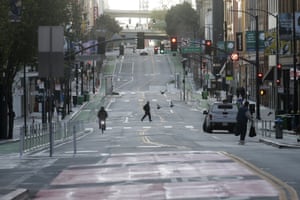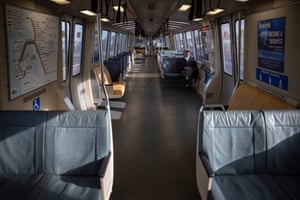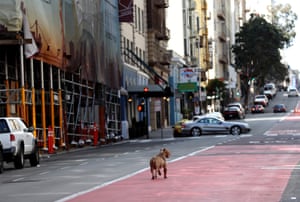On Monday afternoon, as news rippled across the San Francisco Bay area that millions of residents had been ordered to “shelter-in-place” , the streets of Oakland hummed with the energy of a grim Christmas eve.
Shoppers crisscrossed roads, bags in hand, in an urgent dash to stock up on last-minute items before stores closed their doors until at least 7 April – a drastic measure meant to curb the spread of coronavirus that California has reported has sickened more than 472 people, including 326 in the Bay Area, and killed 11, although other sources report the number of confirmed cases at nearly 700.
Restaurants will be delivery or take-out only. Gyms, bars and most stores will shutter – a stinging blow to the local economy, and an opening act to a recession that economists say will hit California hardest.
By midnight, when the shelter-in-place order took effect, the streets of Oakland were as quiet as a temple. Nobody stood in line waiting to get into a local nightclub. Stools at bars had been turned upside down and the lights turned out. Last call had already come and gone on Sunday, when California’s governor ordered all drinking establishments to shut, and wouldn’t come again for weeks.

Unlike the stricter lockdown measures enforced in China and Italy, California’s order doesn’t confine residents to their homes unless they have permission to leave; it also allows grocery stores, pharmacies and business selling items considered essential to remain open.
But Monday’s order nonetheless set off a rush on stores, forcing shopkeepers to grapple with large crowds at the same time health officials have asked everyone to stand at least six feet apart.
Lines at grocery stores stretched outside the door. In an effort to control the size of the in-store crowd, security guards at Sprouts, a mid-size grocery chain that specializes in natural and organic foods, let in no more than 20 customers at a time.
“I’m just picking up a few things,” said Erica Straus as she waited to enter Sprouts. “I felt like this was coming, so I stocked up over the past couple weeks. I didn’t want to have to panic-buy. I’m just hoping we get through it.” Straus said she’s less concerned with her own health than she is about the crippling effect it will likely have on local businesses and residents.
Meanwhile, at a Target across the street, security guard Luis Lugo said the store has been “busier than Christmas”.
“We’re selling out of hand-sanitizer and toilet paper within 5 to 10 minutes of opening in the morning,” Lugo said. And that’s with a cap of six bottles of sanitizer per person and four packages of toilet paper per person, he added. “People are buying them for friends or family, buying as much as they can.”
‘I pray that we’re strong’
As more rural parts of the country are only now waking up to the reality of disruption, Oakland, California, where a cruise ship stricken with coronavirus had docked in the city’s port, got an advance warning that the virus would be impossible to ignore.

While the shelter-in-place order, the first of its kind in the US, marked a dramatic escalation in the state’s response, the last few weeks in the Bay Area have been a slow, hollowing-out of everyday life. The governor this weekend called on all seniors ages 65 and older to self-isolate. Ridership on public transit plummeted 61% in the span of a month. Major tech conferences, athletic contests and concerts had been canceled.
By Monday, many Bay Area companies had already asked their employees to work from home. Gatherings of 35 people had already been banned in Santa Clara county, home of Silicon Valley and more than a third of the state’s coronavirus cases.
Foot traffic on the streets of Oakland’s Chinatown was light for a typical lunchtime rush, but shoppers still made runs on local stores, many wearing masks.
A mother grabbed her daughter’s hand as they walked, making sure to give passing strangers a wide berth. Produce bins have been picked over and emptied as the line at Yuen Hop Noodle Company, a market, snaked to the back of the store.
At the Chinese restaurant Cam Anh, next door to the market, half of the usually-brimming buffet bins had been nabbed by customers as the restaurant prepared for the coming days.
“Here, we have so much freedom, and people do what they want,” said the cashier, who declined to give her name.
“In China, if the government says do it, you better do it, and you better do it right,” she said of the impending lock down.
The cashier pointed to a bin of rice and vegetables, boxed and ready for transport to a nearby not-for-profit that provides meals for clients. To stay afloat financially, Cam Anh plans to sell food to the agency as it locks its doors to in-person diners.
“We help them and they help us,” said the cashier. “We have to help each other. I pray that we’re strong.”
Down the street at Happy Burrito, a Mexican restaurant usually overflowing with patrons, Julia Contreras said she still wasn’t clear on the rules, and whether they’d have to close. But nonetheless, they planned to draw the curtains.
“Nobody gave us a warning, but we don’t have the money to pay the staff,” Contreras said from behind the counter.

‘Panic-buying at cannabis dispensaries’
News of the lockdown also motivated the more recreationally-minded, particularly those looking to stock up on staples such as pot and video games to pass the time during self-isolation.
The line at Oakland’s Blum, a medical and recreational marijuana dispensary, pushed out the door. By 2pm, the store’s supply of marijuana edibles had been cleaned out.
“It’s been nuts,” said a Blum budtender. “I had to keep people from coming in at one point because the line was so crammed together.” He said Blum will stay open, but will reduce staff to a skeleton crew – only enough to serve patients with a medical card for marijuana.
Daniel Ogden
(@OGTrinny)Bay Area, I see your priorities. “There’s panic buying at Cannabis dispensaries” pic.twitter.com/Fu4EMEYYaM
Neither did the cash register slow at GameStop – a retailer that sells games, consoles and collectibles – in the east Bay Area city of Emeryville.
At 8pm, an hour before closing, a line of 20 people, some wearing masks, others drawing hoods over their mouths and noses, looked to purchase items.
The store had reached its weekly sales goal in just two days, said a GameStop staff member. By 8pm Monday, it had reached its daily sales goal four times over.
“We’re going to be stuck at home for at least three weeks,” said Serah Kang as she stood in line waiting to make an advance purchase of Animal Crossing, a game set to be released this week. Kang said the video game wasn’t the first priority on her list of items to buy, but was something that could help her keep grasp of sanity while homebound.
“I think we’re all going to go a little crazy,” Kang said.
🌞 sarah ! 🌞
(@nelltxt)Me going to gamestop to get animal crossing on Friday morning pic.twitter.com/sTkIAiII3h
seally elizabeth busch
(@seallye)me on march 20th leaving my quarantine to pick up animal crossing new horizons from GameStop pic.twitter.com/IoAzU6WX7U
morgan 🦋
(@acornkeep)what gamestop employees see at 9:59AM on march 20th pic.twitter.com/I9LYubwO7S
Jonathan Rosenthal had stopped in to pick up a new gaming system, hoping for an affordable way to keep busy. But after scoping out pricetags on the latest systems, he changed his mind.
“I think I’m just going to read,” Rosenthal said on his way out the door.

